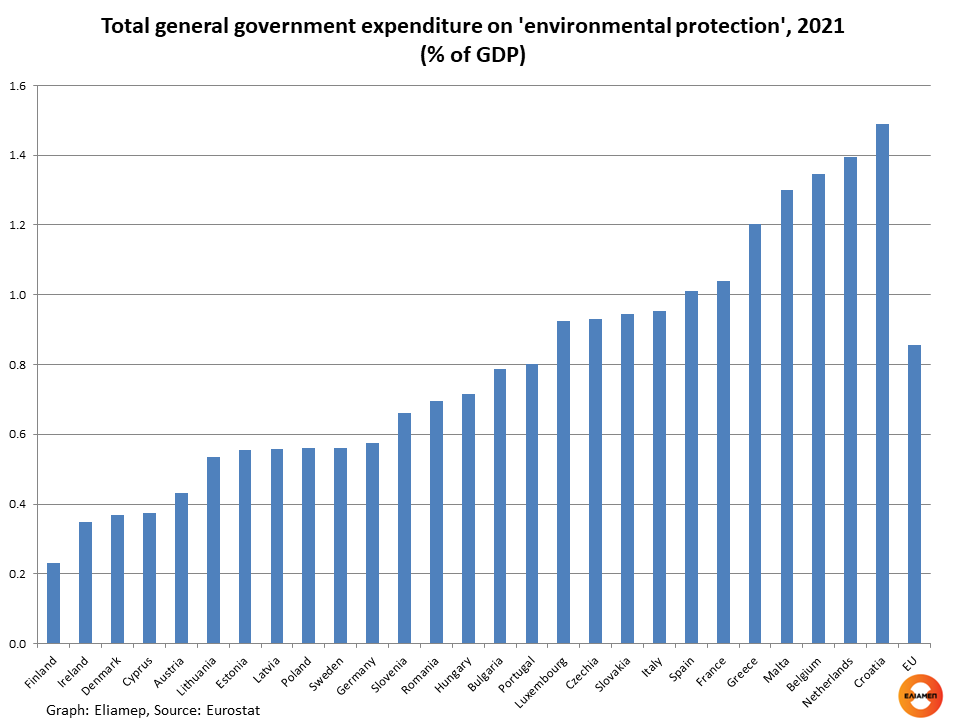General government expenditure in the EU on ‘environmental protection‘ amounted to €119 billion (0.8 % of GDP) in 2021.The largest part of this amount was related to waste management (0.4% of GDP), followed by expenditure on water waste management (0.2% of GDP), while 0.1 % of GDP was devoted to expenditure in each of the following: “pollution abatement’, ‘protection of biodiversity and landscape’ and expenditure not elsewhere classified. Spending on research and development for environmental protection was low in all member states (0.07% of GDP).
EU expenditure on environmental protection remained relatively stable (from 1995 to the present it fluctuated between 0.7% and 0.9% of the EU GDP). Yet, there are notable differences between the Member States. In absolute terms, the countries with the highest spending on environmental protection in 2021 were France (26 billion euros), Germany (20.7 billion), and Italy (16.9 billion).
However, as a percentage of GDP the ranking was quite different. Specifically, in 2021 Croatia devoted the highest ratio of GDP to ‘environmental protection’ (1.5 % of GDP). It was followed by the Netherlands (1.4% of GDP), Belgium and Malta (1.3%). At the other end of the scale, for 2021, Finland reported a ratio of 0.2 % of GDP for environmental protection expenditure followed by Ireland with 0.3 % of GDP. In Denmark, Austria and Cyprus the total public expenditure on environmental protection was also low, amounting to 0.4% of GDP.
In 2021, Greece was in fourth place in the EU in terms of public spending on environmental protection (1.2% of GDP), and in 10th place in the ranking based on absolute figures (2.1 billion). But unfortunately, high public expenditure does not necessarily imply effective environmental protection.
Specifically, in our country 65% of the total expenditure is directed to waste management (compared to EU 44%). The relevant amount (1.4 billion) corresponded to 0.8% of GDP – the highest percentage of all EU member states. However, waste management in Greece often violates EU environmental law, resulting in exorbitant fines. Only for the existence of illegal landfills, our country has paid 66.5 million euros from 2015 until today.
In recent years, progress has been made in some areas of waste management. For example, most illegal landfills are now closed. However, according to a recent report by the European Commission, Greece is at risk of missing the European targets for 2025 : the target of 55% preparing for re-use and recycling of municipal waste and 65% recycling of all packaging waste to be achieved by 2025, as well as the 2035 target (to reduce landfilling of municipal waste).
Our country is also lagging behind in terms of private spending on environmental protection. While in the EU as a whole, corporations spend more (1.2% of GDP) than governments (0.8%) on environmental protection, the corresponding expenditure of Greek businesses does not exceed 0.1% of GDP – the lowest percentage in the EU along with Ireland.
As this summer’s major disasters have shown, protecting the environment is not just a matter of compliance with EU law: it is a matter of vital importance to the sustainability of the country’s production model, which is over-dependent on tourism, and of course to the safety of citizens and visitors.
A recent study by the OECD reports that the composition of public investments in wildfire prevention and suppression in Greece is much more suppression oriented (at the expense of fire prevention expenditure) compared to France and Spain. The same study positively comments on the policy shift from wildfire suppression to wildfire prevention in Portugal, manifested by a reorientation of public expenditure in the period 2017-2021. Funding for wildfire prevention also increased in Greece in 2022. AntiNero wildfire prevention programmes were initiated with the support from the EU Recovery and Resilience Facility, in addition to national funding efforts.
The European Commission’s recommendations to Greece can contribute to the necessary strengthening of environmental policy in our country. This should be accompanied by complementary policy measures that increase citizens’ awareness (e.g. incentives and penalties for waste recycling), and that push the private sector to participate more actively in environmental protection.




